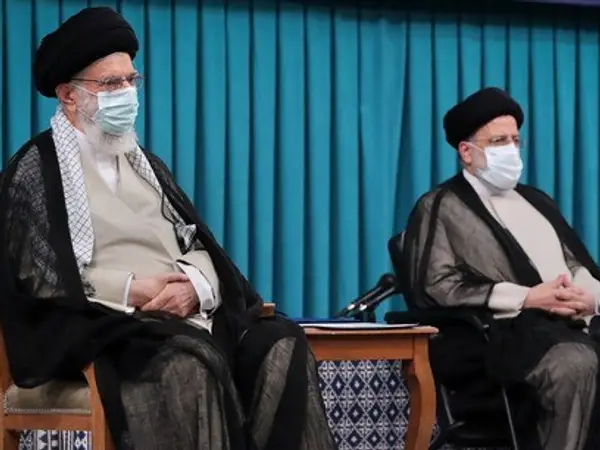A hardline newspaper in Iran said Tuesday that the biggest achievement of Ebrahim Raisi was not following previous presidents by challenging the Supreme Leader.
This had led to “creating a peaceful atmosphere in the country in which higher officials do not take stances that are challenging to the nezam,” a commentary in Javan newspaper affiliated with the Revolutionary Guard opined.
In Iranian political jargon, nezam (system) refers to Supreme Leader Ali Khamenei.
The author, Brigadier-General Abbas Haji-Najari, is a regular contributor.
"This heralds an amalgamation of the administration and nezam after three decades," Haji-Najari wrote under the headline ‘The 13th Administration and Resolution of Dual Sovereignty.’ More than two decades ago, the reformist Saeed Hajjarian applied the term ‘dual sovereignty’ to contrast directly elected representatives – including the president and parliament members – with those appointed by the leader.
Several previous presidents, including Hassan Rouhani but more especially Mahmoud Ahmadinejad (2005-2013) and Mohammad Khatami (1997-2005), all experienced tensions with the Khamenei.
Reformists still cite an open letter sent by 100 parliamentarians in 2004 saying Khamenei had allowed his appointees in the Guardian Council to violate popular rights by judging some legislation unconstitutional, or anti-Islamic, and by not allowing many reformists to stand for re-election.
“Do the members of the Guardian Council dare to resist your orders?” they wrote. “Or is it that, as rumors say, despite your public statements, they were permitted by you to disqualify these people illegally and widely?”
Khamenei said in a 2004 speech that “dual sovereignty” was “not desirable but damaging…[and] what Iran’s enemies want.” The following year, Khamenei overturned a Guardian Council decision blocking two reformists to stand in the presidential election. Both failed to make a run-off ballot won by the principlist Ahmadinejad.
In 2011, Ahmadinejad refused to attend presidential duties for 11 days in protest against Khamenei's insistence that he keep in post the intelligence minister Heydar Moslehi, who the president accused of withholding information from him.
President Hassan Rouhani also made no secret of his frustration with Khamenei and the interference of his appointed bodies in various matters, particularly the nuclear issue and negotiations with the West and the United States.
"We are a great nation that have shown we can resolve the most complex and most important political issue in the world, meaning the nuclear issue, at the negotiation table. We can, therefore, resolve other regional and international issues at the negotiation table," Rouhani said in a speech 25 July 2014.
Rouhani suggested on various occasions that he lacked full support from Khamenei in his attempts to pursue Iran’s interests diplomatically. While Iran had held direct talks with the United States over Afghanistan and then Iraq, contacts were far more extensive in the two years of talks that led to the 2015 nuclear deal, the JCPOA (Joint Comprehensive Plan of Action).
Khamenei said in a speech in October 2015 that he opposed further direct, bilateral talks with the US due to the “many hazards” and lack of benefits offered. In 2018, the US left the JCPOA. The current Vienna talks between Iran and world powers are attempting to revive it.
